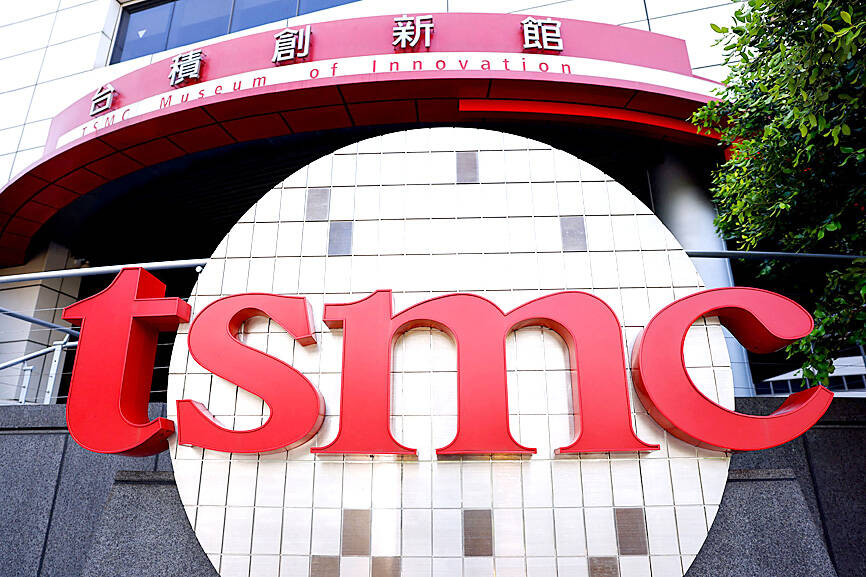Taiwan Semiconductor Manufacturing Co (TSMC, 台積電) expects steady growth this year despite global economic uncertainty due to continued momentum from tech trends such as 5G, artificial intelligence (AI) and high-performance computing (HPC) applications.
In the company’s annual shareholders’ report released on Thursday, TSMC chairman and CEO C.C. Wei (魏哲家) said the company is well-positioned to meet market demand with its differentiated technology platforms.
The company’s 2-nanometer process is on track for volume production in the second half of this year, while its next-generation nanosheet-based A16 process, aimed at HPC applications, is scheduled for mass production late next year, Wei said.

Photo: Ann Wang, Reuter
Advanced technologies — defined as 7-nanometer and smaller — are projected to contribute up to 80 percent of total wafer revenue this year, up from 69 percent last year, the report said.
Wei emphasized the pivotal role of AI, predicting a continued surge in structural demand as devices and systems become increasingly intelligent and interconnected.
“We are entering an AI-empowered world, where artificial intelligence not only runs in data centers, but will run in PCs, smartphones, automobiles, and even Internet of Things devices in the future,” he said.
AI also comes in many forms, including but not limited to generative AI applications such as ChatGPT, which consumers have become familiar with thanks to its ease of use and expansive range of potential applications, he said.
“As a direct user of AI in our fab and research and development operations, we are deriving tangible return on investment benefits from our investments in AI and machine learning,” he said.
Because of the timing and focus of this year’s annual report, neither Wei’s comments nor the report as a whole delved deeply into US President Donald Trump’s controversial tariff policies.
Trump announced tariffs on goods imported from countries around the world on April 2, including a blanket 32 percent tariff on Taiwan.
He on April 9 paused the tariffs for 90 days, although he kept a base 10 percent tariff in place for most countries other than China, while exempting semiconductors.
“Any tariffs imposed on imports of semiconductors and products incorporating chips into the United States may result in increased costs for purchasing such products, which may, in turn, lead to decreased demand for TSMC’s products and services and adversely affect its business and future growth,” the report said.

Taiwan will prioritize the development of silicon photonics by taking advantage of its strength in the semiconductor industry to build another shield to protect the local economy, National Development Council (NDC) Minister Paul Liu (劉鏡清) said yesterday. Speaking at a meeting of the legislature’s Economics Committee, Liu said Taiwan already has the artificial intelligence (AI) industry as a shield, after the semiconductor industry, to safeguard the country, and is looking at new unique fields to build more economic shields. While Taiwan will further strengthen its existing shields, over the longer term, the country is determined to focus on such potential segments as

UNCERTAINTY: Innolux activated a stringent supply chain management mechanism, as it did during the COVID-19 pandemic, to ensure optimal inventory levels for customers Flat-panel display makers AUO Corp (友達) and Innolux Corp (群創) yesterday said that about 12 to 20 percent of their display business is at risk of potential US tariffs and that they would relocate production or shipment destinations to mitigate the levies’ effects. US tariffs would have a direct impact of US$200 million on AUO’s revenue, company chairman Paul Peng (彭雙浪) told reporters on the sidelines of the Touch Taiwan trade show in Taipei yesterday. That would make up about 12 percent of the company’s overall revenue. To cope with the tariff uncertainty, AUO plans to allocate its production to manufacturing facilities in

COLLABORATION: Given Taiwan’s key position in global supply chains, the US firm is discussing strategies with local partners and clients to deal with global uncertainties Advanced Micro Devices Inc (AMD) yesterday said it is meeting with local ecosystem partners, including Taiwan Semiconductor Manufacturing Co (TSMC, 台積電), to discuss strategies, including long-term manufacturing, to navigate uncertainties such as US tariffs, as Taiwan occupies an important position in global supply chains. AMD chief executive officer Lisa Su (蘇姿丰) told reporters that Taiwan is an important part of the chip designer’s ecosystem and she is discussing with partners and customers in Taiwan to forge strong collaborations on different areas during this critical period. AMD has just become the first artificial-intelligence (AI) server chip customer of TSMC to utilize its advanced

While China’s leaders use their economic and political might to fight US President Donald Trump’s trade war “to the end,” its army of social media soldiers are embarking on a more humorous campaign online. Trump’s tariff blitz has seen Washington and Beijing impose eye-watering duties on imports from the other, fanning a standoff between the economic superpowers that has sparked global recession fears and sent markets into a tailspin. Trump says his policy is a response to years of being “ripped off” by other countries and aims to bring manufacturing to the US, forcing companies to employ US workers. However, China’s online warriors